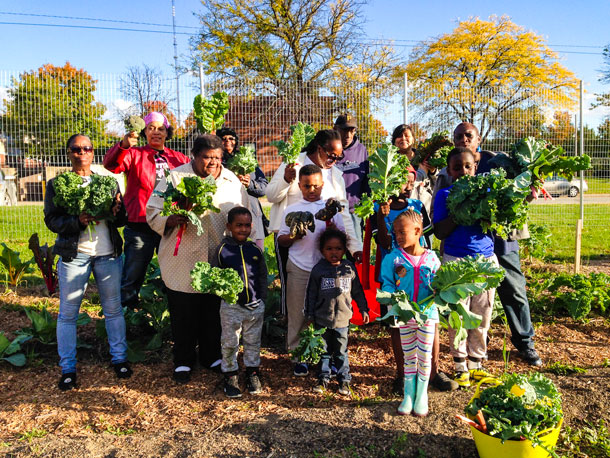There are so many reasons to grow your own food!
Whether you are growing in your own garden, a community garden, or purchasing from an urban farm, being an active participant in your local food system has incredible benefits, including the following:

Bolstering Food Security and Food Sovereignty
According to the City of Pittsburgh’s 2020 FeedPGH Report, one in five Pittsburghers (63,000 residents) are food-insecure. Hunger and food insecurity have increased in our region since then due to the COVID-19 pandemic followed by inflation and soaring food prices. Given that most of the gardens we support are in low-income neighborhoods where grocery stores that stock fresh fruits and vegetables are few or non-existent, the produce grown in the community garden can have a significant impact on a gardener’s diet, and the diets of their friends and family and neighbors. Families who grow at home or in community gardens are able to offset typically 30 to 40 percent of their produce needs by eating food grown in their own gardens and many of the community gardens in Allegheny County also supply food pantries and other free distributions.
Individual and Collective Empowerment
Studies have demonstrated that gardens are places where people can build social capital and community by sharing resources and networks and bonding with other gardeners. This enables participants to be more effective in their home and work lives. The Mount Oliver Borough Community Garden, for one example, has become an important place for the local Bhutanese residents to experience calm and grow culturally relevant crops to feed families in need. Gardens like this become a magnet for neighbors who wish to enact change in their communities, and their impact often stretches beyond the boundaries of the garden.
Cultivating Joy and Relaxation
Beyond the physical benefits of food security and self-sufficiency, gardens also provide an array of emotional and mental benefits. Recent studies suggest that skin contact with lipids in the soil can reduce anxiety and that gardening has the potential to improve our mental health. Growing food and tending to plants also gives folks a tangible way to take care of the earth and each other.
Helping Folks Save Money
Grow Pittsburgh has calculated that a well-managed garden can yield 1.5 pounds of produce per square foot. At the Sharpsburg Market Garden, a community farm style food pantry garden, residents grew 550 lbs of food on 360 square feet of raised beds, at an estimated value of $2,200 in otherwise expensive crops like tomatoes and herbs.
Increasing Access to Nutritious Food
Poor nutrition impacts people throughout their lives, from fatigue and concentration problems at school and work to behavioral and medical problems in both children and adults. Improving basic nutrition is an immediate impact of gardening. Schoolchildren and community gardeners have reported increased consumption of vegetables and decreased consumption of less nutritious sweet foods and drinks as a result of growing their own food.
Areas with limited access to affordable and nutritious food affect 2.3 million Americans who live more than a mile away from a supermarket without having access to a vehicle. Urban gardens and farms can be valuable resources in such areas, especially if the only food options are higher priced convenience store foods and overly processed fast food.
Connecting with the Earth and Helping the Environment
Gardens do much more than beautify backyards and vacant land. They help attract and repair habitats for pollinator species. Gardens provide stormwater capture through the installation of rain barrel systems, by reducing impermeable surfaces and by adding absorptive capacity to the ground itself. The addition of plants to an urban environment reduces the heat island effect produced by expanses of pavement and concrete. Composting is a proven method to divert waste from landfills, avoiding a major cause of the greenhouse gas methane, and results in carbon sequestration and a valuable natural fertilizer. A community garden provides a demonstration space where neighbors see and interact with environmentally sustainable practices.
Creating a Sense of Place
Gardens have long been considered an ideal venue for gathering space, a place of people of diverse backgrounds and interests to come together around a shared interest in beautifying their community and growing food. In many of the neighborhoods Grow Pittsburgh serves, there are few parks or the parks are unsafe, and the garden becomes a de facto green space for meet-ups and discussions.
